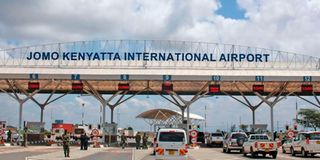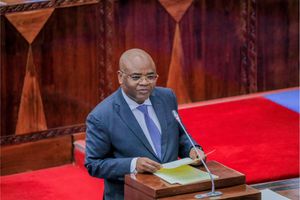Kenyan court blocks proposed lease of JKIA to India's Adani group

Motorists pass through security checks at the entrance of the Jomo Kenyatta International Airport in Nairobi. File | Nation Media Group
What you need to know:
- In the deal, the Indian firm would upgrade the airport, including the construction of a second runway.
- KHRC and LSK argued that Kenya can raise the estimated $1.85 billion needed to expand the airport.
Kenya’s High Court has temporarily suspended the proposed plans to lease the Jomo Kenyatta International Airport (JKIA) to Indian conglomerate Adani Enterprises.
In a case certified as urgent by the High Court, the Kenya Human Rights Commission (KHRC) and the Law Society of Kenya (LSK) challenged the push to take over the running of JKIA by the Indian company for a period of 30 years.
The two organisations argued that JKIA is a strategic and profitable national asset and the deal is, therefore, irrational and violates the principles of good governance, accountability, transparency, and prudent and responsible use of public money.
In the deal, the Indian firm would upgrade the airport, including the construction of a second runway and a new passenger terminal under a 30-year build-operate-transfer (BOT) contract.
KHRC and LSK, however, argued that Kenya can independently raise the estimated $1.85 billion or Ksh238 billion needed to expand JKIA without leasing the airport for the stated period.
“Thus, the Adani proposal is unaffordable, threatens job losses, exposes the public, is diproportionate to fiscal risk, and offers no value for money to the taxpayer,” lawyer Dudley Ochiel said in the application.
High Court judge John Chigiti certified the case as urgent and granted temporary order, suspending the deal pending the determination of the case.
The judge directed the case to be mentioned on October 8, to get a judgment date.
Mr Ochiel submitted that the application will be rendered nugatory and moot if KAA and Adani are not stopped from signing the agreement and Adani goes ahead and acquires JKIA.
The two organisations said they have written unsuccessfully to JKIA, seeking information under Article 35(1) and (3) of the Constitution of Kenya and section 4 of the Access to Information Act.
It is LSK’s argument that Kenya would surrender the operational and profitable JKIA to Adani for 30 years in exchange for $1.85 billion.
“Thus, the proposal would deprive the public of, and transfer to Adani, all the current revenues, receipts, expenditures and other financial transactions over JKIA. Although the project is dubbed a Built Operate Transfer, KAA would be handing over an existing and operational airport to Adani,” Mr Ochiel said.
He added that in the end of the 30 years, Adani would, in perpetuity, retain an 18 percent equity stake in the aeronautical business at JKIA.
“Thus, after 30 years, Adani would be entitled to an 18 percent concession fee starting at Ksh6 billion and increasing by 10 percent every five years forever. In this way, the Adani proposal violates Article 201(c), demanding that the burden and benefits of using resources and public borrowing be shared equitably between present and future generations,” he said.
He submitted that under the deal, Adani would acquire nearly 30 acres of unencumbered land next to JKIA for airport property investment and development business.
Besides, the proposal entitles Adani to operate tax-free for ten years, import labour, and obtain free work visas, thus depriving Kenyan workers of their livelihood, contrary to Articles 26, 41, and 43 of the Constitution.





